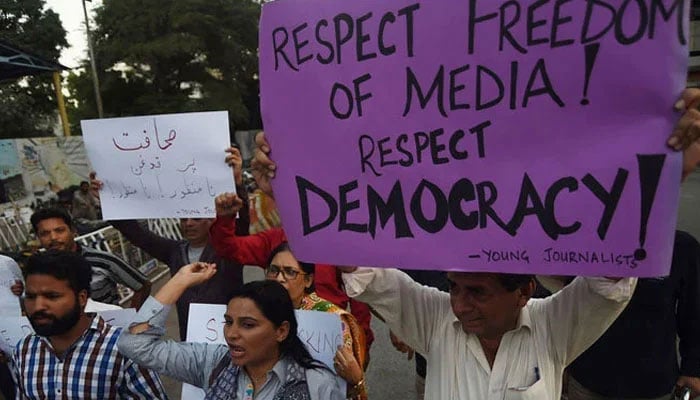CPNE calls for unity, dialogue to fight censorship
Report said press freedom remained under duress during previous year
KARACHI: At least seven journalists were killed in different circumstances in 2024 in Pakistan, an annual report on media freedom by Council of Pakistan Newspapers Editors (CPNE) said on Tuesday.
“The Pakistan Media Freedom Report” for 2024-25 detailed challenges faced by journalists and media professionals across the country last year. It covered incidents ranging from journalists killings, arrests and abductions to legal pressures and forced exiles.
The report said press freedom remained under duress during the previous year. With ongoing challenges posed by both state and non-state actors, journalists operated under increasing pressure with a democratic framework, the CPNE characterised as authoritarian in practice.
The report documented death of seven journalists in connection with their professional work. The report highlighted the past killings of journalists, including those of Arshad Sharif, Ghulam Asghar Khund and Jan Muhammad Mehr, remained unresolved.
The report criticised state inaction and the impacts of laws, such as Prevention of Electronic Crimes Act 2025 (Peca) and Punjab’s Defamation Law 2024, which the CPNE said continued to erode press freedom.
The CPNE report reiterated its demand to repeal Peca 2025 and Punjab Defamation Law 2024, urging inclusive consultation in such future legislative processes.
Ali Kazam Waheed, president CPNE, expressed deep concern over deteriorating state of media freedom in Pakistan. “There is a surge in censorship, violence and harassment against journalists”, he said.
Addressing the report launch, media elders called for unity, dialogue within and outside, a peaceful movement to fight media and social media censorship, which they considered was on the rise. Talking about media freedom situation of the day, Mazhar Abbas said, “These are tough times”.
The media experts have asked for joint editorials, and forming a joint action committee for a peaceful struggle for press freedom and against censorship. They declared new Peca a draconian law.
The experts urged legislation through dialogue and inclusive approach. Wusatullah Khan, senior journalist, said semi-war like situation with India showed Pakistan’s media was responsible and the state elders also admitted this responsibility, and now they should pose confidence in the media.
Celebrating Pakistan victory over India in the recent conflict, senior journalist Hamid Mir said there was a need to improve governance, judicial, governance and media freedom and corruption index as compared to India.
The media elders observed Pakistani media lacked independence. They viewed there was direct and indirect censorship on media and cyber laws were being misused, weaponised against media persons, and individuals criticising the governance models and to silent online criticism.
They called for constitutional supremacy and an informed struggle through constructive grand dialogue and unity of civil society.
Senior journalists, writers, anchorpersons including, Najam Sethi, Absar Alam, Ayaz Amir, President Lahore Press Club and PFUJ leader Arshad Ansari, Chairman Human Rights Commission of Pakistan (HRCP) Harris Khalique also expressed their views.
Representative of Association of Electronic Media Editors and News Directors (AEMEND) Rihan Ahmed read message of Azhar Abbas, president of the association. The representatives of International Federation of Journalists and Pakistan Federal Union of Journalists participated in the launch report.
-
 King Charles Holds Emergency Meeting After Andrew Arrest: 'Abdication Is Not Happening'
King Charles Holds Emergency Meeting After Andrew Arrest: 'Abdication Is Not Happening' -
 Amazon Can Be Sued Over Sodium Nitrite Suicide Cases, US Court Rules
Amazon Can Be Sued Over Sodium Nitrite Suicide Cases, US Court Rules -
 'Vikings' Star Mourns Eric Dane's Death
'Vikings' Star Mourns Eric Dane's Death -
 Patrick Dempsey Reveals Eric Dane's Condition In Final Days Before Death
Patrick Dempsey Reveals Eric Dane's Condition In Final Days Before Death -
 'Heartbroken' Nina Dobrev Mourns Death Of Eric Dane: 'He'll Be Deeply Missed'
'Heartbroken' Nina Dobrev Mourns Death Of Eric Dane: 'He'll Be Deeply Missed' -
 Andrew Mountbatten-Windsor’s Arrest: What Happened When A Royal Was Last Tried?
Andrew Mountbatten-Windsor’s Arrest: What Happened When A Royal Was Last Tried? -
 Alyssa Milano Expresses Grief Over Death Of 'Charmed' Co-star Eric Dane
Alyssa Milano Expresses Grief Over Death Of 'Charmed' Co-star Eric Dane -
 Prince William, Kate Middleton Camp Reacts To Meghan's Friend Remarks On Harry 'secret Olive Branch'
Prince William, Kate Middleton Camp Reacts To Meghan's Friend Remarks On Harry 'secret Olive Branch' -
 Daniel Radcliffe Opens Up About 'The Wizard Of Oz' Offer
Daniel Radcliffe Opens Up About 'The Wizard Of Oz' Offer -
 Channing Tatum Reacts To UK's Action Against Andrew Mountbatten-Windsor
Channing Tatum Reacts To UK's Action Against Andrew Mountbatten-Windsor -
 Brooke Candy Announces Divorce From Kyle England After Seven Years Of Marriage
Brooke Candy Announces Divorce From Kyle England After Seven Years Of Marriage -
 Piers Morgan Makes Meaningful Plea To King Charles After Andrew Arrest
Piers Morgan Makes Meaningful Plea To King Charles After Andrew Arrest -
 Sir Elton John Details Struggle With Loss Of Vision: 'I Can't See'
Sir Elton John Details Struggle With Loss Of Vision: 'I Can't See' -
 Epstein Estate To Pay $35M To Victims In Major Class Action Settlement
Epstein Estate To Pay $35M To Victims In Major Class Action Settlement -
 Virginia Giuffre’s Brother Speaks Directly To King Charles In An Emotional Message About Andrew
Virginia Giuffre’s Brother Speaks Directly To King Charles In An Emotional Message About Andrew -
 Reddit Tests AI-powered Shopping Results In Search
Reddit Tests AI-powered Shopping Results In Search




